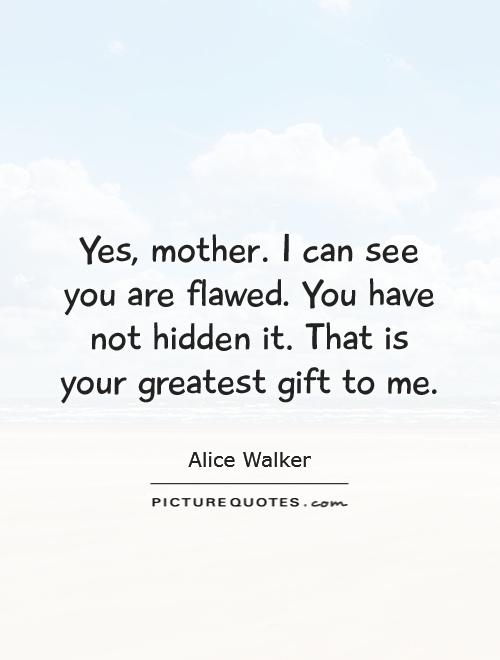Yes, mother. I can see you are flawed. You have not hidden it. That is your greatest gift to me

Yes, mother. I can see you are flawed. You have not hidden it. That is your greatest gift to me
Alice Walker, the renowned author of "The Color Purple," is known for her powerful and thought-provoking writing that delves into themes of race, gender, and family dynamics. In the quote, "Yes, mother. I can see you are flawed. You have not hidden it. That is your greatest gift to me," we can see the complex relationship between a mother and child, and the importance of embracing imperfections.In Walker's work, she often explores the idea of flawed characters and the beauty that can be found in their imperfections. She challenges the traditional notion of perfection and instead celebrates the authenticity and vulnerability that comes with being flawed. In the quote, the speaker acknowledges their mother's flaws but sees them as a gift rather than a burden. This sentiment reflects Walker's belief in the power of embracing our imperfections and using them as a source of strength and growth.
For Walker, the relationship between a mother and child is a central theme in many of her works. She explores the complexities of this bond, including the struggles, conflicts, and ultimately, the love that exists between them. In the quote, the speaker acknowledges their mother's flaws but also recognizes the courage and honesty it takes to not hide them. This vulnerability and openness are seen as a gift, as it allows for a deeper connection and understanding between the two.
Furthermore, the quote can also be interpreted as a reflection of Walker's own relationship with her mother. Walker has spoken openly about her difficult relationship with her mother, who she described as strict and emotionally distant. Despite these challenges, Walker has also acknowledged the strength and resilience she gained from her mother, as well as the importance of embracing imperfections in order to grow and evolve.












 Friendship Quotes
Friendship Quotes Love Quotes
Love Quotes Life Quotes
Life Quotes Funny Quotes
Funny Quotes Motivational Quotes
Motivational Quotes Inspirational Quotes
Inspirational Quotes